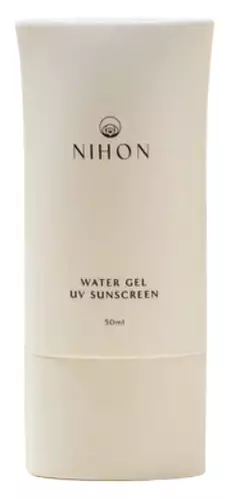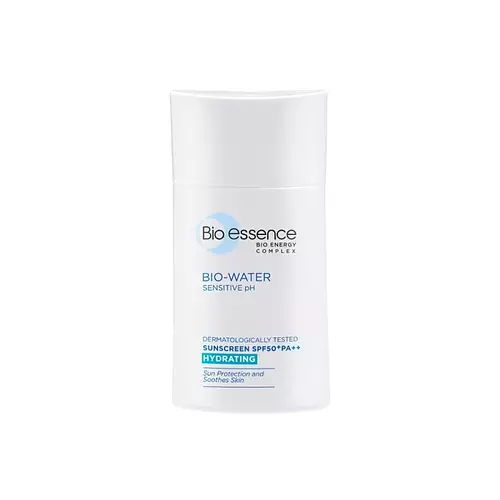Here's our complete breakdown comparing the ingredients, attributes, and more of Nihon Water Gel UV Sunscreen versus Bio Essence Bio-Water Hydrating Sunscreen SPF 50+ PA++ .
Last updated on March 21, 2024. Published on April 06, 2024
Overview
What they are
These products are both sunscreens. They have a total of 6 ingredients in common
Cool Features
They both contain hyaluronic acid, SPF and Vitamin E
Suited For
They're both likely to be good for fighting acne, brightening skin and scar healing
Free From
They both do not contain any common allergens, parabens or sulfates
What's Inside
They both contain silicones
We independently verify ingredients, and our claims are backed by peer-reviewed research. Spot a product that need an update? Let us know.
Sunscreen
Sunscreens help absorb or reflect UV radiation and protect skin against skin damage. Sunscreens may come in the form of lotion, gel, foam, spray, or solid-stick.
Sunscreen
Sunscreens help absorb or reflect UV radiation and protect skin against skin damage. Sunscreens may come in the form of lotion, gel, foam, spray, or solid-stick.
Price
Ingredient Info
Nihon Water Gel UV Sunscreen 25 ingredients
Bio Essence Bio-Water Hydrating Sunscreen SPF 50+ PA++ 33 ingredients
Alcohol Free
This product is free of harsh alcohols 🎉
Contains Silicon
Ingredients in this product that are types of silicon:
Fragrance Free
This product is free of fragrances 🎉
Sulfate Free
This product is free of sulfates 🎉
Paraben Free
This product is free of parabens 🎉
Oil Free
This product is free of oils 🎉
Not Malassezia Safe
Ingredients in this product that are not malassezia safe:
Not Reef Safe
Ingredients in this product that are not reef safe:
EU Allergen Free
This product is free of EU allergens 🎉
Non Vegan
This product is not vegan 😥
Cruelty Free
This product is cruelty-free 🎉
Contains Alcohol
Ingredients in this product that are types of alcohol:
Contains Silicon
Ingredients in this product that are types of silicon:
Contains Fragrance
Ingredients in this product that are forms of fragrance:
Sulfate Free
This product is free of sulfates 🎉
Paraben Free
This product is free of parabens 🎉
Contains Oils
Ingredients in this product that are types of oil:
Not Malassezia Safe
Ingredients in this product that are not malassezia safe:
Not Reef Safe
Ingredients in this product that are not reef safe:
EU Allergen Free
This product is free of EU allergens 🎉
Non Vegan
This product is not vegan 😥
Not Cruelty Free
This product is not cruelty-free 😥
At a glance
Click on any of the items below to learn more
Nihon Water Gel UV Sunscreen 25 ingredients
Bio Essence Bio-Water Hydrating Sunscreen SPF 50+ PA++ 33 ingredients
Notable Ingredients
This product contains 2 ingredients that may have this attribute:
This product contains 3 ingredients that may have this attribute:
This product contains 1 ingredient that may have this attribute:
This product contains 1 ingredient that may have this attribute:
Benefits
This product contains 1 ingredient that may have this attribute:
This product contains 1 ingredient that may have this attribute:
This product contains 1 ingredient that may have this attribute:
Notable Ingredients
This product contains 3 ingredients that may have this attribute:
This product contains 1 ingredient that may have this attribute:
This product contains 1 ingredient that may have this attribute:
This product contains 1 ingredient that may have this attribute:
This product contains 1 ingredient that may have this attribute:
Benefits
This product contains 2 ingredients that may have this attribute:
This product contains 1 ingredient that may have this attribute:
This product contains 1 ingredient that may have this attribute:
This product contains 1 ingredient that may have this attribute:
This product contains 1 ingredient that may have this attribute:
This product contains 2 ingredients that may have this attribute:
This product contains 1 ingredient that may have this attribute:
This product contains 1 ingredient that may have this attribute:
This product contains 3 ingredients that may have this attribute:
Concerns
This product contains 1 ingredient that may have this attribute:
This product contains 3 ingredients that may have this attribute:
This product contains 5 ingredients that may have this attribute:
This product contains 3 ingredients that may have this attribute:
This product contains 2 ingredients that may have this attribute:
Build your routine, track which ingredients work for you, and much more with your free account.
Join SkinSortIngredients Compared
Ingredients that are highlighted in purple are present in both products.
Nihon Water Gel UV Sunscreen 25 ingredients
Bio Essence Bio-Water Hydrating Sunscreen SPF 50+ PA++ 33 ingredients
Water • Butyloctyl Salicylate • C12-15 Alkyl Benzoate • Diethylhexyl Succinate • Neopentyl Glycol Diheptanoate • Butylene Glycol • Bis-Ethylhexyloxyphenol Methoxyphenyl Triazine • Methylene Bis-Benzotriazolyl Tetramethylbutylphenol • Titanium Dioxide • Zinc Oxide • Dipentaerythrityl Tri-Polyhydroxystearate • Triticum Vulgare Germ Extract • Trimethylsiloxysilicate • Cetyl Peg/Ppg-10/1 Dimethicone • Scutellaria Baicalensis Root Extract • Yeast Extract • Dimethicone/Peg-10/15 Crosspolymer • Dimethicone Silylate • Tocopheryl Acetate • Hydrolyzed Wheat Protein/Pvp Crosspolymer • Sodium Hyaluronate • Dimethicone Crosspolymer-3 • Caprylyl Glycol • Polyhydroxystearic Acid • Phenoxyethanol
Water • Cyclopentasiloxane • Alcohol Denat. • Titanium Dioxide • Ethylhexyl Methoxycinnamate • Butyl Methoxydibenzoylmethane • Benzophenone-3 • Butylene Glycol • Phospholipids • C12-15 Alkyl Benzoate • Stearic Acid • Aluminum Hydroxide • Polyhydroxystearic Acid • Aluminum Stearate • Propanediol • Sodium Acrylate/Sodium Acryloyldimethyl Taurate Copolymer • Isohexadecane • Polysorbate 80 • Sodium Hyaluronate • Citrus Grandis Fruit Extract • Ethylhexylglycerin • Ppg-26-Buteth-26 • Peg-40 Hydrogenated Castor Oil • Carbomer • Tranexamic Acid • Niacinamide • Euglena Gracilis Extract • Glycerin • Tocopherol • Triethanolamine • Parfum • Allantoin • Disodium EDTA
Ingredients Side-by-side
Ingredients that are highlighted in purple are present in both products.
Learn more about what what Com. / Irr. ratings are
Ingredients Explained
These ingredients are found in both products.
Ingredients higher up in an ingredient list are typically present in a larger amount.
Water. It's the most common cosmetic ingredient of all. You'll usually see it at the top of ingredient lists, meaning that it makes up the largest part of the product.
So why is it so popular? Water most often acts as a solvent - this means that it helps dissolve other ingredients into the formulation.
You'll also recognize water as that liquid we all need to stay alive. Talk about multi-purpose! If you see this, drink a glass of water. Stay hydrated!
Learn more about WaterNihon Water Gel UV Sunscreen contains this as ingredient number 1.
Bio Essence Bio-Water Hydrating Sunscreen SPF 50+ PA++ contains this as ingredient number 1.
C12-15 Alkyl Benzoate is made up of Benzoic Acid and long chain alcohols. It has a low molecular weight.
C12-15 Alkyl Benzoate is an emollient and texture enhancer. Due to its solubility, it is often used in sunscreens to help evenly distribute active ingredients.
As an emollient, C12-15 Alkyl Benzoate helps soften and hydrate your skin. Emollients create a film on your skin that traps moisture within.
This ingredient has been reported to cause eye irritation.
Learn more about C12-15 Alkyl BenzoateNihon Water Gel UV Sunscreen contains this as ingredient number 3.
Bio Essence Bio-Water Hydrating Sunscreen SPF 50+ PA++ contains this as ingredient number 10.
Butylene Glycol (or BG) is used within cosmetic products for a few different reasons:
- It is a solvent, meaning that it helps to dissolve other ingredients. This also enhances the absorption of the product into one's skin.
- It is a humectant, which means that it helps attract moisture into the skin.
- It helps improve product application.
Overall, Butylene Glycol is a safe and well-rounded ingredient. It is unlikely to irritate skin, and works well with pretty much all other ingredients.
Nihon Water Gel UV Sunscreen contains this as ingredient number 6.
Bio Essence Bio-Water Hydrating Sunscreen SPF 50+ PA++ contains this as ingredient number 8.
Titanium dioxide is known for its UVA and UVB protection properties. It is non-comedogenic and non-irritating. Titanium Dioxide is a physical sunscreen. Physical sunscreens reflect light and prevent it from reaching your skin.
Protecting your skin against UV radiation can prevent the signs of aging. Sun damage is associated with fine-lines, wrinkles, loss of firmness, and hyperpigmentation. Titanium dioxide can help prevent premature aging.
With modern production, nano-scale or fine-grade titanium dioxide can be easily produced for cosmetics. In sunscreen, titanium dioxide absorbs UV light. Our skin is not able to absorb Titanium dioxide, even nanoparticles.
Titanium itself is the 9th most common element in the Earth's crust. Titanium dioxide is formed when oxygen is introduced and can be found in ores, dust, sand, and soil.
Pure titanium dioxide is a white powder that is used in many products to add or change color.
Learn more about Titanium DioxideNihon Water Gel UV Sunscreen contains this as ingredient number 9.
Bio Essence Bio-Water Hydrating Sunscreen SPF 50+ PA++ contains this as ingredient number 4.
Sodium Hyaluronate is hyaluronic acid's salt form. It is commonly derived from the sodium salt of hyaluronic acid.
Like hyaluronic acid, it is great at holding water and acts as a humectant. This makes it a great skin hydrating ingredient.
Sodium Hyaluronate is naturally occurring in our bodies and is mostly found in eye fluid and joints.
These are some other common types of Hyaluronic Acid:
Learn more about Sodium HyaluronateNihon Water Gel UV Sunscreen contains this as ingredient number 21.
Bio Essence Bio-Water Hydrating Sunscreen SPF 50+ PA++ contains this as ingredient number 19.
Polyhydroxystearic Acid is a soft wax made from castor oil.
It is is a texture thickener, emulsifier, and film-former. Emulsifiers prevent ingredients from separating, such as oils and waters.
Polyhydroxystearic Acid may not be fungal acne safe.
Learn more about Polyhydroxystearic AcidNihon Water Gel UV Sunscreen contains this as ingredient number 24.
Bio Essence Bio-Water Hydrating Sunscreen SPF 50+ PA++ contains this as ingredient number 13.
Here's what our community thinks of the ingredients in these two products.
Nihon Water Gel UV Sunscreen 25 ingredients
Bio Essence Bio-Water Hydrating Sunscreen SPF 50+ PA++ 33 ingredients
Usage
Here's some more info on how this product is used by our community.
When to use
Nihon Water Gel UV Sunscreen 25 ingredients
Bio Essence Bio-Water Hydrating Sunscreen SPF 50+ PA++ 33 ingredients
Alternatives
Our Dupe Finder has found 13 potential alternatives that have similar ingredients to Nihon Water Gel UV Sunscreen.
See 13 alternativesOur Dupe Finder has found 50 potential alternatives that have similar ingredients to Bio Essence Bio-Water Hydrating Sunscreen SPF 50+ PA++.
See 50 alternatives
